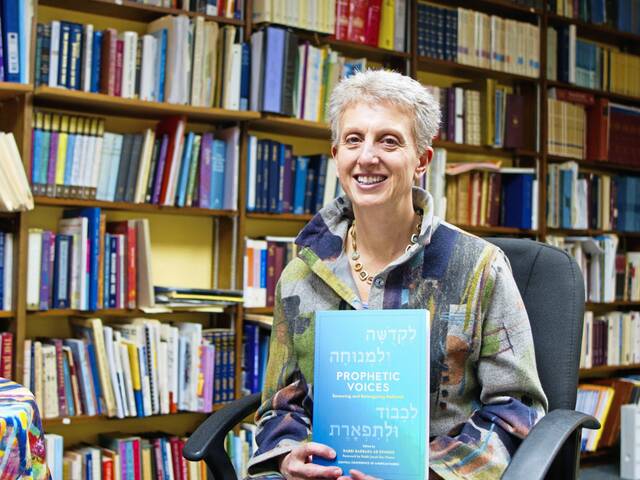https://triblive.com/local/monroeville/prophetic-voices-monroeville-rabbi-edits-book-providing-relevance-for-biblical-writings/
‘Prophetic Voices’: Monroeville rabbi edits book providing relevance for biblical writings

The rabbi of a Monroeville congregation has taken the initiative to bridge an integral part of the Bible with life in the 21st century.
“Prophetic Voices: Renewing and Reimagining Haftarah,” an anthology featuring 179 contributors edited by Rabbi Barbara Symons of Temple David, aims to bring relevance to a longstanding, but often forgotten or ignored, part of Jewish worship services.
Writings of biblical prophets, from Joshua to Malachi, serve as the basis for haftarah readings, which by tradition take place during services on the Sabbath, holidays and fast days following the reading of the Torah, the first five books of the Old Testament.
“The idea is to delve further,” Symons said. “But one problem we have with the current haftarah cycle, as we call it, is that we don’t know what it means.”
Haftarot, to use the plural form of the word, ostensibly relate either to the preceding Torah readings or the holiday being observed at the time. The context, though, may tend to be lost on congregants.
“It also might use language that is difficult for us. The metaphors just don’t stand for us now, or the metaphors are actually problematic,” Symons explained, such as a tendency to portray women as subservient.
Her concern is that a lack of attention to haftarah curbs the advancement of a concept called Prophetic Judaism, “which implies that we’re working to repair the world.”
As such, “Prophetic Voices” offers contemporary interpretations of biblical writings by Isaiah, Ezekiel, Amos and others, along with alternative prophetlike texts spanning Jewish history. Contributors selected applicable material for inclusion and penned their own commentaries.
“If Prophetic Judaism is somehow repairing the world, then these voices of the contributors are helping us with ‘how’: How can I move forward with this?” Symons said.
The anthology features four sections, with the first addressing the history of haftarah from biblical times to the present. Next comes a section offering haftarot to accompany weekly Torah portions, followed by those relating to the traditional Jewish calendar.
“Haftarot for the American Jewish Calendar” focuses on observations including Martin Luther King Jr. Day, Pride Month, Indigenous Peoples’ Day and even Baseball Opening Day, with an essay about Oakland A’s pitcher Ken Holtzman opting out of a 1973 league championship game scheduled on Yom Kippur:
“That morning, a limousine took him to Baltimore Hebrew Congregation, where he was escorted to the synagogue’s front row and was seated next to Jerry Hoffberger, owner of the Baltimore Orioles.”
Symons lauded Holtzman’s decision as sending a powerful message.
“He put his Jewish identity and values ahead even of the support for his team in a playoff game,” she said, “and two Jews from opposing teams were able to sit together for Yom Kippur.”
She grew up as part of a justice-focused congregation in Schenectady, N.Y. — “My parents were chairs of the social action committee at one point” — but eventually noticed a de-emphasis on haftarah and, by extension, the words of prophets in that regard.
During a 2018 social justice conference sponsored by the Religious Action Center of Reform Judaism, she decided to share her observations.
“In the very last hour, they said, ‘Take the microphone if you have an idea of how to bring forward social justice. See if anyone wants to join you in it, and go off and find a room and see what you can do,’” she recalled. “I brought forward my idea, and about five of us went off into a room. And we started to play with the idea of short, contemporary interpretations. We did some amount of work over the next year and a half or so, on and off.”
Symons had gone on sabbatical shortly before the start of the covid-19 pandemic and used the time to complete the anthology, which is published by CCAR Press, a division of the Central Conference of American Rabbis.
The book is available online as of March 14, and an in-person launch is scheduled for March 26 at Temple David Congregation, 4415 Northern Pike, where Symons has been rabbi for 17 years.
For more information about “Prophetic Voices: Renewing and Reimagining Haftarah,” visit www.ccarpress.org/shopping_product_detail.asp?pid=50553.
Copyright ©2026— Trib Total Media, LLC (TribLIVE.com)
